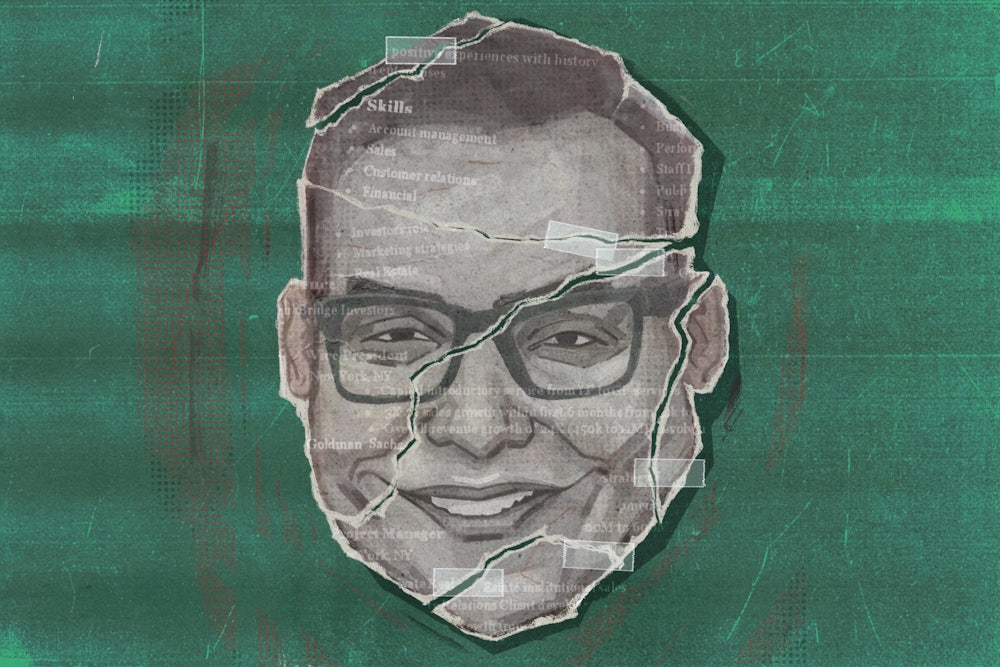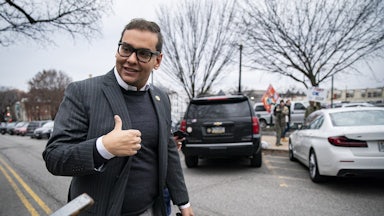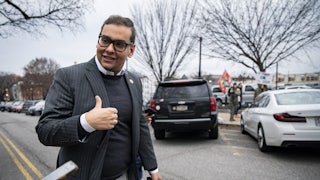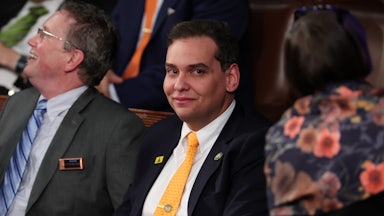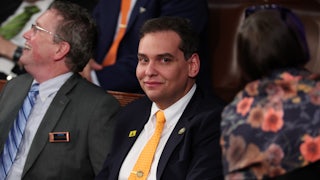It wasn’t long after his election to Congress last fall that people began to realize that George Santos was not what he’d seemed. But how did he get elected to begin with? Why did it take so long for the national media to pick up on Santos’s many, many embellishments? Where was the opposition research on this guy? On episode 61 of The Politics of Everything, hosts Laura Marsh and Alex Pareene chat with TNR staff writer Daniel Strauss about the first two months of Santos in Washington, with political consultant and campaign veteran Tyson Brody about the rules of the oppo-research game, and with TNR deputy editor Jason Linkins about Santos’s durability and what that says about the health of our political culture.
ABC7 news clip: Republican George Santos admits he made up major details of his résumé and background following a New York Times investigation. But Santos is insisting he will not resign.
CNN news clip: To get down to the nit and gritty, I’m not a fraud. I’m not a criminal who defrauded the entire country and made up this fictitional character and ran for Congress. I’ve been around a long time. I mean, a lot of people know me. They know who I am. They’ve done business dealings with me.
Alex Pareene: Opposition research—the practice of digging up dirt on your political opponents—is often referred to as a dark art. The term evokes memories of dirty tricks and October surprises. Campaign veterans and political reporters fondly repeat favorite stories of candidates laid low by unearthed soundbites or long-buried scandal.
Laura Marsh: But for all the cultivated mystique around the practice, it can seem sometimes that a lot of so-called oppo either falls flat or arrives too late.
Alex: Last year, a little-known New York Republican named George Santos was elected to the House of Representatives. Almost immediately after his election, The New York Times reported that his résumé was full of lies. And that article was merely the first in a series of increasingly ridiculous revelations, as more and more people who had interacted with Santos made accusations of fraud, theft, and often quite bizarre dishonesty.
Laura: He claimed his family had fled the Holocaust and that his mother was a 9/11 survivor.
Alex: As the stories piled up, people have asked how his Democratic opponent last November managed to whiff a race against such a flagrant liar.
Laura: The election of George Santos raises the question of how opposition research actually works—and whether it still works at all. I’m Laura Marsh.
Alex: And I’m Alex Pareene.
Laura: This is The Politics of Everything.
Alex: George Santos’s win in New York’s 3rd district, traditionally a Republican stronghold, wasn’t terribly close. He beat his Democratic opponent, Robert Zimmerman, by about eight percentage points. His win helped Republicans take control of the House of Representatives. And then the questions began. Now, less than two months into his term, 78 percent of his constituents want Santos out. TNR staff writer Daniel Strauss, who covers Capitol Hill, joins us to discuss how we got here. Daniel, thank you for joining us.
Daniel Strauss: Thanks for having me.
Alex: In the weeks immediately following the election, how did this George Santos story unfold? What were sort of the first revelations that suggested Santos was not entirely the person he’d been presenting himself as?
Daniel: He didn’t work for marquee banking and financial groups in New York like Goldman Sachs. He carried himself as someone from a great deal of money who had expensive taste and could back it up with personal wealth, such as going to Nantucket often and having sterling academic credentials, like having graduated from the NYU Stern School of Business. But The New York Times found that there were small tells indicating that Santos did not actually have the wealth that he reported on federal documents. My favorite detail in this story was that he would say he went to the NYU business school, but when an alumni would mention it in passing, using the usual nomenclature for alumni, he wouldn’t know what they were talking about.
Laura: So not the best-researched story. Just like broad strokes, it seems like.
Alex: It does feel like the revelations have just been snowballing—it’s almost never- ending. You sort of wake up every morning and there’s a new one. He has a lie involving Spider-Man. Can you fill us in on that one?
Daniel: Yeah, he misrepresented himself as a producer for a Broadway show of Spider-Man to donors. I don’t know why, and I don’t know why, again, he gets himself into this situation, and I actually don’t know Broadway super well, but I do know that this particular show did not do very well anyway.
Alex: No. It was a notorious flop—Spider-Man: Turn Off the Dark. I mean, it was such a disaster of a show that falsely presenting yourself as a producer of it is a strange thing to do for a number of reasons.
Daniel: Yeah.
Laura: It seems like he was trying to hit a lot of big New York beats—Broadway, having all the clothes, going on fancy vacations. He was sort of approximating someone who would be a big deal, just kind of all over the place.
Daniel: The other thing is that Santos represented himself as a sort of too-good-to-be-true Republican. He said he was Jewish. He’s brown-skinned. He said he’s gay. And you know, if you are a low-information Republican voter, you’re like, “Yeah, this sounds great. Let’s diversify the party a little bit more.” And I think part of the reason that this story is persisting in the news and in the American news ecosystem is because, like, my favorite thing is that oftentimes a George Santos story would refer to him in a headline or in the dek as “the talented Mr. Santos.” It’s a very familiar story to us right now—and in general—not only because of The Talented Mr. Ripley, and it seems like there are a lot of similarities there, but also Anna Delvey and frauds in high places, which is an ongoing thread in the American discourse. And this one is amazing because the lies don’t end.
Laura: It’s interesting because, as you said, these figures of the fraud or the con artist do loom very large in the culture right now. We’ve had a million HBO, Netflix, Hulu miniseries dramatizing the lives of Anna Delvey and Elizabeth Holmes and the Crypto King and so on and so on. And yet we don’t really seem to be very good at spotting these characters when a new one pops up. When the first Times piece came out about George Santos, a question a lot of people raised was, “Well, why didn’t you report on this before the election, when people were still figuring out who to vote for?” Did anyone close to the campaign have a sense that this guy might not be who he says he is?
Daniel: Yeah. In the district, there was a strong sense that something didn’t smell right about Santos, and the umbrella campaign committee for House Republicans kept their distance from him. They refrained from pouring as much money as they could have into that race. Kevin McCarthy also, then the House minority leader, avoided campaigning in the district because Santos just didn’t fit right. I was able to get my hands on the opposition-research book that Democrats had, and what that is is that’s a collection of information, of negative information, about a candidate that a campaign can use against them. And it is a long, long list for Santos. But the explanation that you’ll see from national and local reporters is that there just wasn’t enough attention on this race. So that’s sort of how he slipped through the cracks.
Alex: There’s an interesting contradiction there, because since the election, Santos has become sort of the main character of American politics in a lot of ways. But it’s almost as if these stories were less relevant before he actually managed to get into Congress. So there were all of these threads that could have been pulled and there was opposition research saying that a lot of his background doesn’t really add up. You almost figure that one of the checks that are supposed to stop people like Santos from getting in is embarrassment: this idea that if you run for office, all of your dirty secrets will be uncovered. And it seems like, if you’re just completely shameless, that might not matter enough for you.
Daniel: Yeah. And he had nothing to lose. I mean, he had been evicted multiple times. He really didn’t have much money to his name. He didn’t have the education that he wanted. So he’s taken on this approach of “Go big or go home,” and frankly, that’s worked out for him until now. There’s not much Republicans can do to force him out beyond where he is now. He has recused himself from the two committees he was appointed to, but he’s still a vote in Congress. He’s still walking around.
Alex: I think this gets at some of the ways in which our system was upheld by norms that may not be as strong as they once were, because there’s not a clear-cut way to be rid of Santos now that he is in office. Constitutionally, he’s elected. He’s sworn in. He’s a member of Congress. There’s nothing he’s done that is disqualifying him from serving. And the thing that traditionally would have gotten rid of him is that he just would have been so shamed and embarrassed, he would have resigned. And if you just decide not to, we’re seeing the limits of what can actually be done beyond just continuing to report every new thing that comes up.
Daniel: I think the sense I’ve gotten from some of my sources is that there is a strong expectation that he will be soundly defeated in the next election in 2024 regardless of the atmosphere elsewhere, because he has branded himself in such a bad way, and polling shows that most of the district wants him out.
Laura: So basically, the message here is that you can tell all manner of lies with no consequences and get two years in office. Not bad!
Daniel: Well, yeah, you get two years in office, but you may get extradited back to your country, and I can’t think of any industry that would hire him again. He’s facing multiple investigations, both from the American government and the Brazilian government. The only way out for him, I think, is for him to become one of those C-list heroes of the right who really stuck it to the left by defying norms.
Alex: It’s sort of easy to imagine one future being, possibly, minimum security prison, and then another future being like the right-wing cruise circuit.
Daniel: I will say, though, I will buy his book. If he writes a book after this, and he charges $34.99 or whatever exorbitant price such a book would cost, I would read every page. Because it’s such, again, it is such a weird, fascinating story, and it does make you ask, like, “Maybe I could have become a Navy SEAL if I had just lied my way through everything?”
Laura: Yeah. I think that will be the best novel of 2024 if he manages to.
Alex: It’ll be called “a really inventive debut” by the reviewers.
Laura: Daniel, thanks so much for talking to us.
Daniel: Thanks for having me.
Laura: After the break, we’ll talk about the practice of opposition research in political campaigns and why Santos, as a candidate, slipped through the net.
Laura: The holes in George Santos’s story raised a lot of questions, not just about the candidate himself. It also suggested there had been a failure on the part of his opponent and on the part of the press to find out the truth. Why was The New York Times only reporting this story after the election, not during the campaign? Why hadn’t his democratic opponent dug out these facts about him and used them? There’s a whole industry devoted to digging up exactly this kind of dirt in elections, and it’s more complicated than it might seem. We’re talking now with Tyson Brody, who’s been an opposition researcher for more than 12 years, about how opposition research really works. Tyson, thanks for coming on the show.
Tyson Brody: Thanks for having me.
Laura: So you’ve been an opposition researcher for Democrats for several years. Can you start by explaining what oppo research is supposed to do?
Tyson: Opposition research is just sort of looking into everything good and bad about a candidate. You look into your own candidate too. The idea is you want the news to be as good about your candidate and as bad about the opponent as possible. And so you just go through their personal history, their professional history, their political history, and you just want see where are the holes, where are the gaps, or just where they said something—like, “Oh man, if I give this to a reporter, they’re gonna have a lot of fun with it.”
Laura: What kind of thing is seen as really significant? Because you could comb through someone’s past and find out they have an unpaid parking ticket and no one’s going to care. It’s not going to influence an election. When opposition research really works, and when you find something really explosive, what kind of fact are we talking about?
Tyson: Part of the problem is, and I think this is actually very relevant to the George Santos situation, is that the sexy part of opposition research is the investigative reporter aspect. You’re digging through the files, you’re connecting all these financial assets or transactions and claims and proving that they’ve done misconduct or something like that. And a lot of times, that simply doesn’t pan out. It’s just a lot of work, a lot of reporters fairly don’t have the bandwidth to do it. You’ve seen with Santos that there was just not that much coverage because not many people were interested in the race until he won. The best kind of stuff has generally always been someone saying something dumb on camera.
Laura: So this would be, like, someone was on a talk show 10 years before they even thought about running for office, they made a comment that now seems really tin-eared, and you are going to resurface that in the campaign. And having that video of that person saying something stupid is really powerful, but maybe having something from their tax returns that you have to explain, it’s kind of abstract and has less of an impact.
Tyson: Yeah. It’s much easier to convey the information on something like that: “They said something bad,” as opposed to, “Ah, he claimed a deduction that wasn’t really there,” or he’s taken advantage of something that says he lives in a different state, etc., etc.
Alex: And my impression is that it has to also fit a story the campaign wants to tell. It can’t just be any old thing—it has to fit into what kind of story they want to tell about their opponent or the race.
Tyson: Yeah. Especially for things like a congressional or something like that. You already know what are the top-testing messages against your opponent or what the ideal thing would be. So your mind is directed there to look for that, to find those patterns as opposed to creating a whole new path and doing all the extra leg work and trying to convince people that this is a thing.
Laura: So if you were looking at a race where voters really care about abortion and January 6, and then the research you have against someone is, “Oh, they own stocks in a company that has really bad labor practices,” maybe that’s not something you’re even going to bother surfacing.
Tyson: You can pitch it! I mean, it never hurts to pitch something, right? But, it’s just like, someone writes it up and what happens after that?
Alex: Especially for listeners who have not been on either end of this exchange, how does the process by which opposition research becomes journalism actually work?
Tyson: So let’s say that I’ve done my work. I’ve put together a pitch document. A pitch document is just gonna have a short summary of what I think the story is, then point- by-point evidence with citations and links of all of the claims you’re making. You give it to a reporter. And after that, it’s on the reporter’s side to actually look into this. Do they think this is interesting? And then after that, I’m just bugging you to be like, “Hey, how’s it going? Is there anything else? Oh, I found out this extra thing. Maybe this will help.”
Laura: When people think about it, they think there’s going to be this smoking gun—one example Alex and I discussed before the show is the Gary Hart presidential campaign, where there’s this photo of the candidate with a beautiful woman that’s not his wife—and this will sink the candidacy of this person. That doesn’t happen very often, but I think people have this idea that there will be something very dramatic like that that could come out of opposition research.
Tyson: Obviously it’s just much more entertaining and cool that way. Like, you know, people will joke, “Oh opposition research, it looks nothing like it does in the movies, the reality of it.” Yeah, because it’s actually quite boring: I’m just reading through a bunch of Nexis transcripts or looking at microfiche or maybe on hour 12 of some horrible YouTube playlist I have set up to hopefully catch someone saying something dumb.
Laura: I wanted to ask how this business has changed, because with a candidate like Trump, you have so much material, potentially, to use and say, “Look at this stuff he did that was bad,” right? There isn’t just one “gotcha” moment—there’s a huge array of them. Does that complicate things because there’s just so much bad stuff out there that it almost seems like it stops mattering?
Tyson: Yeah. The story I could tell about Trump is that we could spend weeks working on what I would consider a very good hit. But getting anyone to write about it is tough because every day he would just go on the news and say something the equivalent of like, “It should be illegal to be Mexican” or something like that. And that’s all people are going to talk about, and that’s what they should probably talk about. It’s more interesting than his doing financial misconduct or something.
Laura: Let’s talk about the Santos campaign a bit more, because there was opposition research, but it didn’t surface. What do you think happened there?
Tyson: I think what happened is they put together what they thought were the top hits. Some of them were good. They got a lot of him saying some nutty stuff and supporting things like abortion bans. I think they said he paid the legal bills for January 6 rioters and things like that. And they even got some of the other investigative things: that the charity was fake, never registered the dog rescue. But as to what happened then, it’s out there, I don’t know if they were pitching it a lot. It just probably wasn’t that interesting to people. And frankly, it was probably hard to get people to care about George Santos. Even if you’re like a member of the press that lives in that district, his potential constituents are the people that read your paper, it just wasn’t, I think, as sexy as the story of other things that were going on, and that’s a hard thing to deal with. And I think people just didn’t think that the Republicans were gonna do as well in New York, let alone like run the table in Long Island. The reason The New York Times looks into him is he’s only interesting because he won, right? Otherwise he was just gonna be some gadfly who had just lost by 12 points the year before or whatever.
Alex: Tyson, thank you so much for talking to us today.
Tyson: Yeah, thanks for having me. Hope it was helpful.
Laura: You can read Tyson Brody’s op-ed, “George Santos and How Opposition Research Really Works,” in The New York Times.
Alex: After the break, we’ll discuss whether Donald Trump, who famously said he could shoot someone on Fifth Avenue and get away with it, has permanently altered, at least for Republicans, the power of oppo.
Alex: More than 10,000 people have served in Congress since the founding of the Republic, and we’d be naïve to assume George Santos is the only liar among them. We’re certainly living in a time where serial fabulism seems to pay off at least for a while. TNR’s deputy editor Jason Linkins posed the question recently in his Power Mad newsletter: Where would an inveterate liar and con man be most welcomed in politics? The clear answer, he says, is the Republican Party. Jason, welcome back to the show.
Jason Linkins: Hey, it’s good to be here.
Alex: So we’ve established that a lot of people actually knew at least a little bit about Santos before the whole story went national, so to speak. His democratic opponent’s campaign knew there were inconsistencies in his background but essentially said they didn’t have enough money to do more research. Republicans knew, some doubled down on his candidacy anyway, and only one media outlet, The North Shore Leader, actually reported on those inconsistencies. Santos, of course, won his election by 142,000 votes. So what do you think Santos was thinking? Do you think he thought he would get away with this or what?
Jason: I think that the guy is, at least on some level, somewhat pathological. His lies are such a wilderness of oddities. He lies about strange things, like that he was a star volleyball player at Baruch College—which is just so specific. You really have to at some point decide, “You know I’m going for it. I’m a star volleyball player at Baruch College.”
Alex: You’re right. It’s not like he was carefully crafting a backstory. He was just kind of seizing on things as they came to him.
Jason: I remember movie critic Joe Queenan once had a joke about being in a restaurant in, like, Shaker Heights or somewhere, and the waitress told him that the restaurant served the best tiramisu in Shaker Heights. Queenan said, “You may as well just say you serve the best tiramisu in Ohio, because I’m not going to check.” I kind of think that this sort of weird tiramisu phenomenon is what happened in this district.
Laura: This whole situation has raised a number of questions about the two parties and how they each approach opposition research and how effective having really good oppo on someone can even be. Because all this stuff has come out about Santos; he’s still in office; his party has not really—the national party, at least—called for him to step down or tried to discipline him in any way. So one question is how much does it even matter if you have all these lies in your past and you are a serial fabulist, if you are a Republican?
Jason: Well, the obvious thing to say about that is that Donald Trump was a sort of similar Gish gallop of obviously disqualifying things and lies, and it didn’t impede him in any way, shape, or form in the way that gaffes and gotchas used to. Donald Trump kind of destroyed the gaffe. It used to be that you could say something stupid and it would get four days of news coverage and maybe even damage, to a certain extent, your hopes. In a lot of ways, Trump rewired our brains.
Laura: A question I have is whether there’s now an asymmetry in politics, where oppo research can’t hurt Republicans but it can hurt Democrats. An example that comes to mind, also a New York race, though in this case actually just a state Senate race, was the enormous amount of oppo research that came out against Julia Salazar when she was running, with some similar echoes of the Santos story. She said she had Jewish heritage, which, I don’t know why people keep claiming this—they think they’re gonna resonate with voters in New York more if they say that they’re Jewish somehow? But she was really hammered in the press for all this stuff that came out about her. The press raked through details of babysitting gigs that she’d had as a teenager.
Jason: I think there is an asymmetry. I think that Democrats are hamstrung by the fact that they can never appear to be a cynical party and that the Republicans are so obviously cynical about things. Republicans don’t really promote policies anymore. They’re largely not trying to be productive in the traditional sense. One of the things I talk about in the piece I wrote on this matter, the reason I think Santos is a model Republican, is that Republicans, for as long as I can remember, have essentially been running scams on their own base. They ran direct mail schemes. They hooked their base on penny stock scams and miracle cures. They’re still doing that today. The problem is the Democrats have, unfortunately, for better or for worse, decided they’re going to be the party of slightly higher standards. And it’s sometimes an albatross around their neck. During the 2020 campaign, Democrats had to be the party of Covid responsibility, so they weren’t out campaigning in places where they traditionally campaigned, where they traditionally had people knocking on doors. Sometimes you pay the price to be the noncynical party. I don’t know how we ever equalize that. The Republicans spend a lot of money.
Laura: And it seems there’s an extra element here too, because not only does some of the dirt that comes out about these candidates not harm Republicans, you could even argue that it’s helped them. You ran a piece by Alex Shephard that argued that the whole circus around George Santos has actually benefited Republicans. How does that work?
Jason: If George Santos had not become a thing, then probably the headlines in the early part of the new GOP House majority’s era would have been about the “fair tax” proposal that they put forward, which is essentially a super regressive form of taxation that hamstrings working-class and middle-class people. It’s a crazy idea, and it’s the kind of thing that if you were a Democrat, you would probably want to immediately make the face of the new majority. But instead what was happening was George Santos was in the headlines at all times.
Alex: It’s funny that you say it sort of takes the heat off of Republicans for their actual terrible agenda, because I think, to some extent—I don’t want to blame the Zimmerman campaign too much here, because New York had a bad cycle for Democrats for a lot of reasons—but I think to some extent they were trying to figure out how to go after Santos for like being a Republican. Like, “Here are the unpopular policy positions that he holds.” And in doing so, they missed the actual Santos story. And then that happens writ large with the entire new Republican House majority, where there’s no attention paid to their insane policy agenda because all of the attention is being paid to the nuttiest nut in the caucus.
Laura: He’s obviously a very outlandish figure, and that’s why this has been such a big story. But I wonder if you think there is a kind of Rubicon being crossed here, as in this shows how much you can get away with? I think we saw with the Access Hollywood tape before the 2016 election, “Oh, you can have this awful video of you come out and still become the president.” Do you think this is a continuation of that trend or is this just a blip?
Jason: I think that if we’ve not crossed the Rubicon, we’ve certainly neared it. And this is also a story of institutional gatekeepers. Why, ultimately, did Trump become president after the Access Hollywood tape became something in clear, full view of everyone? It’s because the people who made the rules about who was and who was not a Republican said it was OK. I think with George Santos, because he’s such a marginal figure, and a humiliating figure in a lot of ways, you do see some Republicans say he’s got to go, but it’s McCarthy’s caucus, McCarthy wants him to stay, so he stays. I believe you already see the fact that he’s staying giving him a little bit more legitimacy than he had when this started. His career may come to a very quick end as soon as voters have the chance to do something about him, but for the time being, I think that Santos has gotten away with it. And now he’s going to have an opportunity to do legitimate congressman things, and that could potentially save him in the end.
Laura: Thanks so much for talking with us, Jason.
Jason: Yeah, sure thing.
Alex: Read Jason Linkins’s article “George Santos Is a Model Republican” on NewRepublic.com.
Laura: The Politics of Everything is co-produced by TalkHouse.
Alex: Emily Cooke is our executive producer.
Laura: Lorraine Cademartori assisted on this episode.
Alex: Myron Kaplan is our audio editor.
Laura: If you enjoy The Politics of Everything and you want to support us, one thing you can do is share your favorite episode with a friend.
Alex: Thanks for listening.
